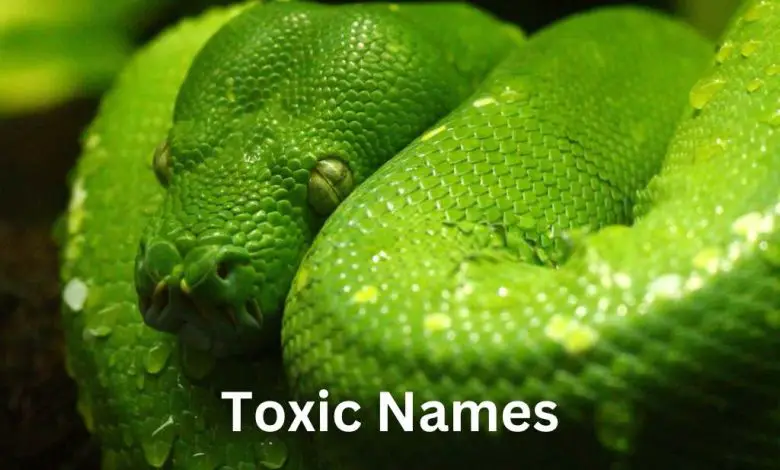100 Toxic Names for Villains

Fellow name enthusiasts and word wizards! A topic as toxic as the gooey green slime we used to play with as kids (minus the fun, unfortunately). That’s right, today we’re diving headfirst into the treacherous realm of toxic names – those monikers that could make even the most cheerful person cringe.
Brace yourselves for a whole lot of facepalming, eye-rolling, and maybe even a few giggles along the way. Prepare to meet the names that would make Shakespeare turn in his grave and drive your English teacher to tear out their hair in despair. Let’s dive in, shall we?
One theme that arises when discussing toxic names is the impact they can have on a person’s self-esteem. Imagine growing up with a name that is constantly mispronounced or mocked. So buckle up, my friends, because we’re about to take a rollercoaster ride through some hilariously awful name choices.
Read Also>> Black Dragon Names
How To Choose The Toxic Names For Your Character?
Choosing a toxic name for a character involves selecting a name that embodies negative traits or connotations, reflecting the character’s malevolent or harmful nature. It’s important to consider the background and personality of the character, as the name should be a reflection of their attributes or actions. Opt for names that evoke a sense of danger, darkness, or deceit. For example, names derived from poisonous plants or venomous animals can be quite effective.
Boy Toxic Names
Explore a realm of menacing allure with our collection of toxic names for boys, each one echoing tales of danger and intrigue.
- Cain – Biblically, the first murderer, symbolizing betrayal and jealousy.
- Vlad – After Vlad the Impaler, historical figure known for cruelty, symbolizing brutality.
- Iago – Shakespeare’s villain in Othello, representing deceit and treachery.
- Damon – Sounds like “demon,” often associated with evil and darkness.
- Loki – Norse god known for trickery and mischief, symbolizing deceit.
- Hades – Greek god of the underworld, associated with death and the afterlife.
- Mordred – Arthurian legend character who betrayed King Arthur, symbolizing betrayal.
- Caligula – Roman emperor known for cruelty, representing tyranny and madness.
- Judas – Biblical figure who betrayed Jesus, symbolizing betrayal and treachery.
- Moriarty – Sherlock Holmes’ archenemy, representing cunning and evil intellect.
- Sauron – The main antagonist in The Lord of the Rings, symbolizing oppressive evil.
- Ares – Greek god of war, associated with violence and conflict.
- Voldemort – Main antagonist in Harry Potter, representing evil and fear.
- Dracula – Famous vampire, symbolizing darkness and bloodlust.
- Grendel – Monster in Beowulf, representing fear and destruction.
- Khan – After Genghis Khan, known for ruthless conquests, symbolizing brutality.
- Ramsay – Game of Thrones character known for cruelty, symbolizing sadism.
- Darth – Prefix in Star Wars’ Darth Vader, symbolizing darkness and evil.
- Tybalt – Hot-tempered character in Romeo and Juliet, symbolizing aggression.
- Hyde – From Dr. Jekyll and Mr. Hyde, representing duality and evil within.
- Seth – Egyptian god of chaos, symbolizing disorder and conflict.
- Anakin – Star Wars character who became Darth Vader, representing fall from grace.
- Chucky – Horror movie doll, symbolizing terror and malevolence.
- Scar – Villain in The Lion King, representing jealousy and cunning.
- Gollum – Character in The Lord of the Rings, symbolizing corruption and obsession.
- Hannibal – As in Hannibal Lecter, representing cannibalism and cunning.
- Norman – From Norman Bates in Psycho, symbolizing madness and duplicity.
- Lucifer – Another name for the devil, representing ultimate evil and rebellion.
- Ivan – After Ivan the Terrible, known for tyranny, symbolizing oppression.
- Kylo – Star Wars’ Kylo Ren, representing conflict and anger.
- Mephisto – Short for Mephistopheles, representing deception and temptation.
- Nero – Roman emperor known for cruelty, symbolizing tyranny and destruction.
- Omen – Sign of something bad to come, symbolizing foreboding.
- Poe – Surname of Edgar Allan Poe, associated with macabre and dark tales.
- Quirrell – Harry Potter character, symbolizing weakness and manipulation.
- Ra’s – As in Ra’s al Ghul from Batman, representing immortality and ruthlessness.
- Saruman – Character in The Lord of the Rings, symbolizing betrayal and power lust.
- Thanos – Villain in Marvel Comics, representing destruction and power.
- Uriah – Biblical figure used by David, symbolizing exploitation and victimization.
- Vega – Sounds like “vague,” often associated with uncertainty and deceit.
- Walter – As in Walter White from Breaking Bad, representing corruption and descent into evil.
- Xerxes – Persian king known for invasion and arrogance.
- Yago – Variation of Iago, symbolizing deceit and manipulation.
- Zed – Often associated with the last, the end, or something ominous.
Read Also>> Paladin Names
Girl Toxic Names
Delve into the shadows of mystique with our selection of toxic names for girls, each one woven with strands of enigma and dark charm.
- Jezebel – Biblical queen known for wickedness, symbolizing seduction and treachery.
- Delilah – Biblical figure who betrayed Samson, symbolizing deceit and manipulation.
- Lilith – Jewish mythology figure, often associated with darkness and seduction.
- Medusa – Greek mythological figure, symbolizing danger and petrification.
- Morgana – Sorceress in Arthurian legend, representing magic and betrayal.
- Bellatrix – Character in Harry Potter, representing loyalty to evil and sadism.
- Carmilla – Early literary vampire, symbolizing seduction and danger.
- Electra – Greek character with a tragic story, symbolizing conflict and vengeance.
- Hera – Greek goddess known for jealousy, representing spite and vengeance.
- Ivy – As in Poison Ivy from Batman, symbolizing seduction and danger.
- Jinx – Implies bad luck or curse, symbolizing misfortune and chaos.
- Kali – Hindu goddess associated with destruction, symbolizing power and change.
- Livia – Wife of Roman Emperor Augustus, known for her cunning and alleged poisonings.
- Maleficent – Fairy tale character, symbolizing wrath and revenge.
- Narcissa – Name suggesting narcissism, symbolizing self-obsession and vanity.
- Ophelia – Tragic character in Hamlet, often associated with madness and despair.
- Pandora – Known for opening the box of evils, symbolizing unintended consequences.
- Queenie – Suggests entitlement or superiority, often associated with high maintenance.
- Ravenna – Character in Snow White and the Huntsman, symbolizing envy and power lust.
- Salome – Biblical figure, associated with seduction and the death of John the Baptist.
- Tamsin – Sounds similar to “poison,” often associated with toxicity and danger.
- Ursula – Villain in The Little Mermaid, representing deception and greed.
- Vixen – Implies cunning and seduction, often associated with manipulation.
- Wicked – Directly associated with evil and malevolence.
- Xantara – Sounds exotic and mysterious, often associated with unknown dangers.
- Yzma – Character in The Emperor’s New Groove, symbolizing vanity and power hunger.
- Zenobia – Ancient queen known for her rebellion and pride.
- Azula – Character in Avatar: The Last Airbender, representing ambition and ruthlessness.
- Blair – As in The Blair Witch, symbolizing horror and mystery.
- Circe – Greek enchantress, known for transforming men into animals, symbolizing manipulation.
- Drusilla – Name from ancient Rome and Buffy the Vampire Slayer, often associated with darkness.
- Eris – Greek goddess of chaos and strife, symbolizing discord and conflict.
- Fatale – Suggests a femme fatale, symbolizing seduction and danger.
- Griselda – Known for enduring hardships in folklore, often associated with sorrow.
- Hex – Implies a curse or spell, symbolizing supernatural malice.
- Isolde – Character in Tristan and Isolde, associated with tragic love and fate.
- Jadis – The White Witch in The Chronicles of Narnia, representing coldness and cruelty.
- Katrina – Reminiscent of Hurricane Katrina, often associated with destruction.
- Lucretia – Historical figure and Borgia family member, associated with intrigue and poison.
- Mystique – X-Men character, symbolizing deception and shape-shifting.
- Nimue – Lady of the Lake in Arthurian legend, representing enchantment and mystery.
- Onyxia – Sounds like “onyx,” associated with darkness and mystery.
- Persephone – Greek goddess of the underworld, symbolizing duality and loss.
- Rue – Represents regret or sorrow, often associated with lamentation.
- Siren – Mythological creature luring sailors to their deaths, symbolizing temptation and danger.
- Trixie – Often associated with trickery or deceit, symbolizing cunning.
- Vesper – Evening star, often associated with darkness and mystery.
- Willow – While often beautiful, can be associated with weeping or sadness.
- Xenia – Greek concept of hospitality, but can be seen as a façade for ulterior motives.
- Ygritte – Game of Thrones character, representing fierce independence and unpredictability.
- Zephyra – Suggests a turbulent wind, often associated with unrest and change.
Read Also>> Warlock Names
FAQs
Q. What makes a name ‘toxic’ in character development?
A toxic name typically conveys negative connotations or associations. It often reflects attributes of danger, malevolence, or deceit, aligning with the character’s harmful or villainous nature. Names derived from words related to poison, darkness, or historical figures known for treachery can be considered toxic.
Q. How do I choose the best toxic name for a character?
The best toxic name for a character should align with their personality, background, and the role they play in the story. Consider names that evoke a sense of unease or danger, and ensure they fit the cultural and thematic context of your narrative. Researching names with dark or harmful meanings can also provide inspiration.
Q. Are there any precautions to take when selecting a toxic name?
Yes, it’s important to be culturally sensitive and avoid using names that might unintentionally offend or alienate readers. Additionally, ensure that the name is suitable for the story’s audience and doesn’t carry unintended meanings that could detract from the character’s impact.
Q. Can a toxic name influence how readers perceive a character?
Absolutely. A well-chosen toxic name can immediately set the tone for a character, signaling to readers that they may be malevolent, untrustworthy, or dangerous. This can shape readers’ expectations and perceptions from their first introduction to the character.
Q. Should a toxic name be explicit or subtle?
This depends on your narrative style and the story you’re telling. Subtle toxic names can be more nuanced and may require readers to delve deeper into the character’s nature. In contrast, explicit names immediately establish the character’s toxic traits. Both approaches have their own merits and can be effective in different contexts.
Q. Can a character’s name evolve from toxic to non-toxic as they develop?
Yes, a character’s evolution can be mirrored in a change of name or how they are referred to throughout the story. This can symbolize a transformation from a malevolent to a more positive or complex character, adding depth to the narrative.
Q. How important is the cultural context in choosing a toxic name?
Cultural context is very important. Names carry different meanings and connotations in different cultures, so it’s crucial to understand the cultural background of your audience and setting. A name that is toxic in one culture might be benign or irrelevant in another, so it’s important to choose a name that aligns with the cultural context of your story.
Conclusion
In conclusion, the impact of toxic names cannot be overlooked. Whether it is in the workplace, a social setting, or through online interactions, the use of derogatory and harmful names can have detrimental effects on individuals’ mental and emotional well-being. It is essential for individuals to recognize the power of their words and to refrain from using toxic names that perpetuate negativity and harm.
Organizations and online platforms also have a responsibility to create environments where toxic names are not tolerated and where individuals feel safe and respected. Let’s strive to cultivate an atmosphere of kindness, empathy, and inclusivity by being mindful of the names we use and standing up against toxic behavior whenever it arises. Together, we can work towards creating a world where everyone feels valued and supported.
By focusing on uplifting and empowering names, we can contribute to a society that promotes positivity and growth. Choosing words that inspire confidence instead of tearing others down can significantly impact not only our personal relationships but also the overall culture we live in.
To foster an atmosphere of kindness and empathy, organizations must take active measures to address toxic behavior within their platforms. Implementing strict guidelines against using harmful names creates a safer space for everyone involved, ensuring that all voices are heard without fear of ridicule or belittlement.



